One of the surprises of this most surprising year has been the resurgence of older patterns and pastimes. As we have spent more time in our homes, sales of books have shot up. For those of us who love to read, this is a bit of good news in a year of little good news.
Different folk like different books, and I’m curious what bookstore managers, such as Tiffany Phillips of Wild Geese Bookshop in Franklin, will discover at the end of the year about what types of books sold well.
It would be logical for escapist literature, whether it be romances, mysteries or historical fiction, to have been popular in these trying times. And I suspect that inspirational literature, whether poetry, biographies, and religious or self-help books, has had increased sales.
During this year of lockdowns, quarantines and a surplus of alone time, I have found it helpful to read authors who have something unexpected to say. Thomas Merton, the most widely-read monastic writer of the twentieth century, has been a personal favorite. I have been especially drawn to the journals that he wrote toward the end of his life.
While Merton for decades had been a Trappist monk cut off in many ways from ordinary life, for much of that time he yearned for a life of even greater solitude. Despite the fact that Merton was an extrovert, he desired to be a hermit monk, experiencing God and nature in solitude.
You can probably spot the irony of reading Merton in a time of pandemic. While people around the world are desperate for vaccines that will free them from the confines of their homes to return to packed sports stadiums, theaters, and places of worship where they can see and hug friends, here was someone who desired what most of us have had too much of in 2020 — alone time.
Yet, reading authors such as Thomas Merton in a time of pandemic might not be so counterintuitive after all. When we have too much of something that wears us down, such as alone time, we might find that’s the perfect time to learn from those who mastered the experience, who knew the difference between loneliness and solitude.
Thomas Merton is not the only master of solitude. Quaker writers provide clear lessons on how to embrace silence, for they know that silence isn’t the absence of noise but rather the presence of something else — something divine and potentially healing. One of the modern Quaker masters, Thomas Kelly, taught at nearby Earlham College in Richmond in the mid-twentieth century. His Testament of Devotion is a masterpiece on solitude and how to find it. Hint: Kelly believed that solitude is within all of us, waiting to be discovered.
There is also a host of contemporary Buddhist authors, such as Thich Nhat Hanh and Pema Chodran, who speak from the center of solitude and are trustworthy guides for those searching for that same center. In a bookstore, move over a few shelves from Buddhist literature and we’ll find the immense wisdom of Native American authors on solitude waiting for us.
For those who don’t find religious literature to their taste, David Thoreau’s Walden Pond offers an timeless invitation to enter and experience solitude. John Muir, Aldo Leopold, and Sigurd Olson might be considered the step-children of Thoreau, writers who also found in nature the solitude that healed their souls.
All of these authors found hidden treasure in solitude, something that we are tempted to disparage and dismiss in this pandemic.
Yes, it will be good to experience the joys of community when we are finally on the other side of the coronavirus. But we will have failed the test of these long days if we miss what solitude can teach us.
David Carlson of Franklin is a professor emeritus of philosophy and religion. Send comments to [email protected].




